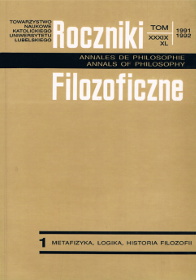Arystotelesa problem οὐσία
Abstrakt
In the Aristotelian conception of being the problem of οσα is the crucial question. Although he thinks that beings are existing things (concretes) he also believes that they should be studied in a scientific way. Hence he studies existing things (beings) in two aspects − ontic and epistemological − and this is why οσα appears either as the reason for a being’s being or sometimes as the reason for a being’s identity. Aristotle formulates two fundamental conditions of being οὐσία here: independence in being and identity (unchangeability). The pure form (God) meets these conditions in the highest degree and hence He is the most perfect being. However, every being-thing (apart from the pure form) is intrinsically complex, basically composed of matter (potentiality) and form (act). In this composition the form is more important as it is the form that determines both being and cognizability of the being-thing, and hence Aristotle gives it the name of οὐσία. Although form exists only in connection with matter, in the Stagirite’s metaphysics − as result of a definite epistemology’s telling upon it − there is a strong tendency to treat the very form as οὐσία par excellence.
Copyright (c) 1992 Roczniki Filozoficzne

Utwór dostępny jest na licencji Creative Commons Uznanie autorstwa – Użycie niekomercyjne – Bez utworów zależnych 4.0 Międzynarodowe.





